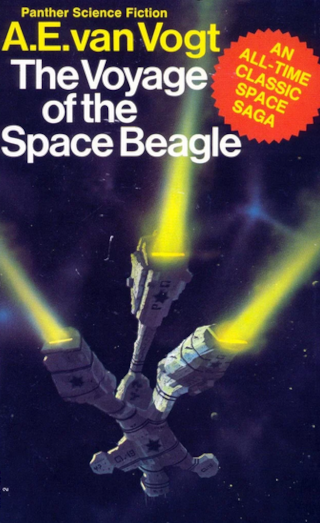
The Voyage of the Space Beagle
By A. E. van Vogt
This book comes from the "Golden Age" of science-fiction - a period usually thought of as being the 1940's. The novel itself was published in 1950 but is composed of four stories published the previous decade (a so-called "fix-up" novel). Van Vogt is a new author to me.
The Voyage of the Space Beagle is considered a classic of the science-fiction genre and contains some of his first or earliest published work. It has had a significant influence on later science-fiction, especially films like Forbidden Planet and Alien, as well as TV series like Star Trek. The setting is a spaceship on a scientific survey mission, much like Darwin's original Beagle. It encounters some alien creatures, most of whom are hostile and dangerous. As well as some exciting action, the book explores the workings of science, in particular, Vogt's ideas of the compartmentalisation of the various scientific fields - his "nexialism" discipline aims to bring them together as a whole. The book also explores relations on board between the scientists and their leadership. There is a form of democracy on the ship but also a surprising amount of discord between some members of the scientific body.
This is a short read and one that contains plenty of action, even though some of it feels slightly dated. The "Discord in Scarlet" section includes a particularly horrifying and dangerous alien, one that could inspire some nightmares in a reader less inured to modern science-fiction horror (like Alien). It might be a little old-fashioned sometimes but this is mainly the way the men (there are only men on board!) interact and think: the civilian scientists have a somewhat military bearing as well. In some ways it is refreshing: direct and to the point. Like an older black and white film, men are in suits perhaps but the film is still great. I will read more van Vogt.
As a last word: it is not uncommon for people to believe that we're cleverer today, more intelligent and sophisticated than those that came before us. At least those before the twentieth century. But this is not true. People of the Middle Ages, for instance, certainly had less scientific or technological knowledge, but were no less intelligent. I had a slight prejudice against older science-fiction in the same way but realise now how wrong this is, having read a bit now and thought about it. It is a genre of ideas and the science or technology is just one aspect, and not necessarily an important one.
The Science Fiction Encyclopedia has an entry on the Golden Age of science-fiction. This is a great resource. Online only now but I was very lucky to find a paperback copy going cheaply in a charity shop a few months ago.



